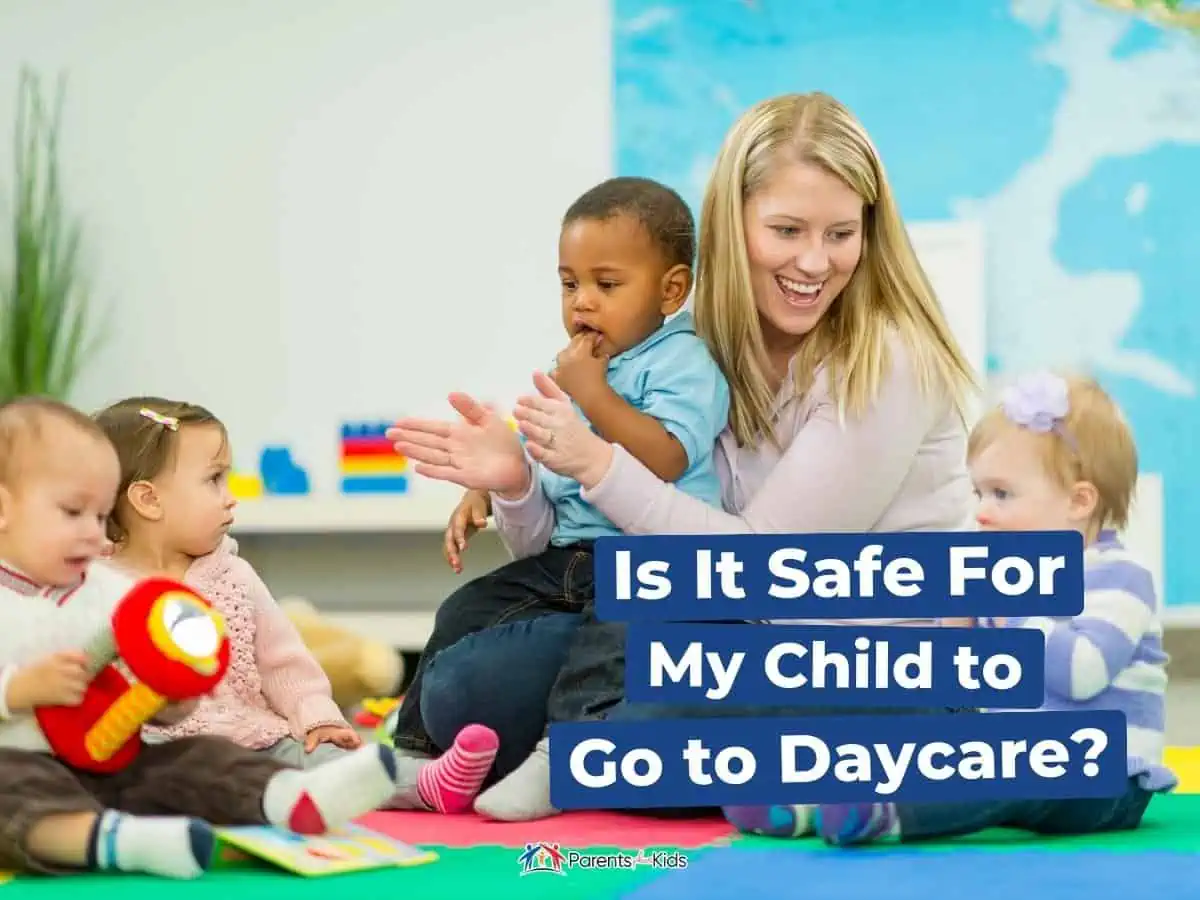Is It Safe For My Child to Go to Daycare?

This post may contain affiliate links. If you buy through the link, I may earn a commission. Learn More.
Daycare is a place that cares for your child when you cannot.
When you have work or other responsibilities, daycare ensures a safe and loving environment for your child.
Unfortunately, sometimes daycare doesn’t feel like the best choice. Is it a safe place or should you look elsewhere for childcare?
Are Daycares Safe?
Yes. Most daycare facilities are very safe. Their primary focus is on keeping your child healthy and cared for. However, there are always exceptions. You need to do your own homework on daycares before you choose the right one for your child.
How Safe is Daycare?
I am one of those people who watch the news all the time. Admittedly, it’s not always by choice.
My husband will turn on either CNN or the local news and leave the room, then I’m too lazy to turn off the television. Still, I manage to stay somewhat informed.
Unfortunately, it feels as though there is a new story about a daycare calamity almost every day. It is enough to make any parent terrified of daycare.
When I was seeking daycare for my own children, my husband and I spent weeks visiting facilities, interviewing caregivers, and weighing our needs against our finances.
I came to the conclusion that daycare is very safe as long as you choose the right one (and you’re able to pay for it).
What To Look For When Consider If Your Daycare is Safe
Licensing and Certifications: Who is Watching Your Child?
Daycares are required to be licensed. These licenses ensure that basic safety needs are met.
Though the requirements vary from state to state, you can expect, at minimum, that a license ensures the facility is properly maintained, staff is certified, and an emergency plan is in place.
There are a couple of problems with relying on only daycare licensing as proof of safety.
Not All Daycares Are Licensed
First, not all daycares have to be licensed.
Many states do not require in-home daycares to hold licenses as long as they have a small number of children in their care (this threshold varies by state).
In my home state, in-home daycares can have as many as six children without the need for a license.
This does not mean the daycare isn’t safe but it does mean it doesn’t have government oversight.
Related: In-Home Daycare vs Daycare Center
Some Daycares Do Only the Bare Minimum
A second issue is that some daycares may stick to the bare minimum without going above and beyond.
The rules that must be adhered to for a state license may not be all that is needed for a safe environment.
Though licensing is not necessary for all daycares, you should ensure anyone who is watching your child is certified.
Daycare certification requires criminal background checks, drug screening and knowledge of first aid and CPR. Again, this is the minimum.
Certification is very easy to obtain. Even my 13-year-old daughter is certified to watch children.
Therefore, you should make sure they are certified but that is only the first step in determining if the facility is safe enough for your child.
Staff-to-Child Ratio: The More the Messier
An important aspect of safety in a daycare setting is the staff-to-child ratio. Your daycare should have one daycare provider in place for every four to 10 children depending on their age.
You should note that facilities with smaller ratios tend to cost more.
You will probably spend around $1,000 per month, depending on your location. That number grows even higher as staff increases.
Real World Example
My own children attended a daycare that had a one-to-four ratio for toddlers and one-to-eight for preschoolers.
The cost was $400 per month.
That may sound like a great deal until I tell you that they only attended this daycare for four hours, two days per week.
Security Systems: The Ins and Outs of Daycare
Security needs to be taken seriously when it comes to daycare safety.
Children should not be able to leave the facility on their own, which means external doors should be safety-proofed or otherwise protected against small hands.
Windows should have similar barriers.
In addition, your childcare facility should not allow anyone on-site who isn’t a guardian or a vetted worker.
A daycare with security code-protected doors and/or gates is the best option.
They should also have security cameras on the premises and a plan in place in case an intruder does try to enter the facility.
Transparency: Do You See What They See?
A great advent in technology is the ability to watch what is going on at a daycare without actually being there.
Many have wifi cameras in place that let parents check in on their children throughout the day.
These are usually protected by a secure website or through a dedicated app.
It shouldn’t be a dealbreaker if the daycare facility doesn’t offer this benefit, but it is an added bonus.
Reaction and Response: Communication is Key
How swiftly the daycare facility responds to you is a key factor in determining their safety.
It may seem unrelated, but a daycare that is responsive to your needs is likely to be responsive to the needs of children as well.
Conversely, if they do not respond to you in a timely manner or are evasive with answers to questions, it should raise a red flag.
Key Takeaways
It is only natural to be worried about sending your child to daycare.
However, there are plenty of safe options that will help your child be happy and healthy during the day.
What are your thoughts on daycare? Tell us in the comments!
